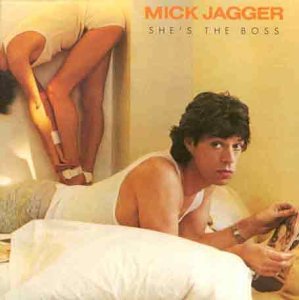It’s understandable that Bill would need to stretch his creativity, having been demoted to the least respected Stone once Ron Wood became Keith’s fulltime pal. But the idea of a Mick Jagger solo album, after over two decades of being both the voice and key creative consultant of the band, made even less sense. What could he do on his own that he couldn’t accomplish with the band he ran with an iron fist?
The answer lies in a Latin phrase we don’t feel like looking up, but roughly translates to “the question answers itself.” Mick was always interested in contemporary beats, while Keith and Woody were happy to play the same Chuck Berry riffs in between drinks and snorts. Each of the Stones albums so far had something “danceable” on it, but only so much. The new worldwide deal with CBS had the key provision that Mick would be given the opportunity to do solo albums; crafty as he always was, he figured his name would be enough to sell units, and possibly unshackle himself from the band that was becoming an albatross. Attaching his voice to a song credited to the Jacksons, in an attempt to cash in on the phenomenal success of Thriller (not coincidentally, another solo project by someone previously associated publicly with a band he no longer needed) gave him something of a test shot.
Hence, She’s The Boss, which accomplishes the feat of sounding nothing like the Stones save a few lines here and there, since he didn’t change his voice at all. He produced the album with Bill Laswell and Nile Rodgers (who also supplies the loudest guitars not already played by Jeff Beck), both of whom knew a thing a two about being contemporary as well as commercial. Keith gets writing credit on “Lonely At The Top”, one of dozens of songs out at the time that sounded exactly like “Footloose”, but no other Stones are involved at all. “½ A Loaf” tramples a metaphor with dated keyboards, while “Running Out Of Luck” and “Turn The Girl Loose” would have been lesser tracks on any Stones album, the latter particularly with its angry “ladies’ rap” over the fade. “Secrets” and the title track each labor over the same riff with a lot of yelling.
All this time later, the most palatable songs are the ones chosen as singles, and both are on side two. “Just Another Night” and “Lucky In Love” (which is about two minutes too long) could almost pass as Stones songs, if a little poppy. “Hard Woman” is the token ballad, with pretty Paul Buckmaster strings, although it’s not easy to buy Mick as a lovelorn, heartbroken sap this late in his tabloid career.
She’s The Boss isn’t a bad album for a piece of product, but fails as an out-of-expected-genre experiment by not being adventurous enough. However, it wasn’t the most embarrassing thing he released that year. That honor still belongs to his duet with David Bowie on “Dancing In The Street”, thrown together for the Live Aid concert. The song was bad enough; the video made it excruciating.
Mick Jagger She’s The Boss (1985)—2

No comments:
Post a Comment